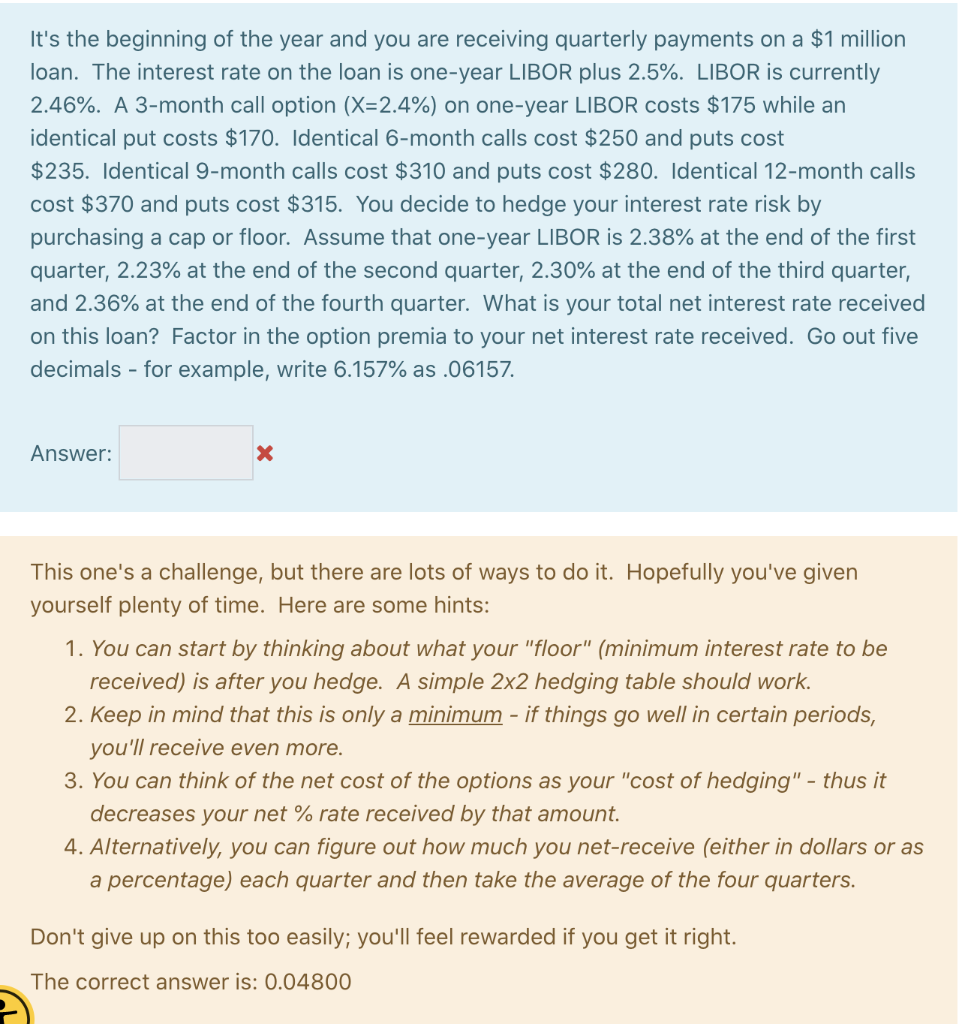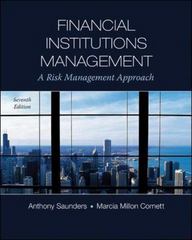
It's the beginning of the year and you are receiving quarterly payments on a $1 million loan. The interest rate on the loan is one-year LIBOR plus 2.5%. LIBOR is currently 2.46%. A 3-month call option (X=2.4%) on one-year LIBOR costs $175 while an identical put costs $170. Identical 6-month calls cost $250 and puts cost $235. Identical 9-month calls cost $310 and puts cost $280. Identical 12-month calls cost $370 and puts cost $315. You decide to hedge your interest rate risk by purchasing a cap or floor. Assume that one-year LIBOR is 2.38% at the end of the first quarter, 2.23% at the end of the second quarter, 2.30% at the end of the third quarter, and 2.36% at the end of the fourth quarter. What is your total net interest rate received on this loan? Factor in the option premia to your net interest rate received. Go out five decimals - for example, write 6.157% as .06157. Answer: X This one's a challenge, but there are lots of ways to do it. Hopefully you've given yourself plenty of time. Here are some hints: 1. You can start by thinking about what your "floor" (minimum interest rate to be received) is after you hedge. A simple 2x2 hedging table should work. 2. Keep in mind that this is only a minimum - if things go well in certain periods, you'll receive even more. 3. You can think of the net cost of the options as your "cost of hedging" - thus it decreases your net % rate received by that amount. 4. Alternatively, you can figure out how much you net-receive (either in dollars or as a percentage) each quarter and then take the average of the four quarters. Don't give up on this too easily; you'll feel rewarded if you get it right. The correct answer is: 0.04800 It's the beginning of the year and you are receiving quarterly payments on a $1 million loan. The interest rate on the loan is one-year LIBOR plus 2.5%. LIBOR is currently 2.46%. A 3-month call option (X=2.4%) on one-year LIBOR costs $175 while an identical put costs $170. Identical 6-month calls cost $250 and puts cost $235. Identical 9-month calls cost $310 and puts cost $280. Identical 12-month calls cost $370 and puts cost $315. You decide to hedge your interest rate risk by purchasing a cap or floor. Assume that one-year LIBOR is 2.38% at the end of the first quarter, 2.23% at the end of the second quarter, 2.30% at the end of the third quarter, and 2.36% at the end of the fourth quarter. What is your total net interest rate received on this loan? Factor in the option premia to your net interest rate received. Go out five decimals - for example, write 6.157% as .06157. Answer: X This one's a challenge, but there are lots of ways to do it. Hopefully you've given yourself plenty of time. Here are some hints: 1. You can start by thinking about what your "floor" (minimum interest rate to be received) is after you hedge. A simple 2x2 hedging table should work. 2. Keep in mind that this is only a minimum - if things go well in certain periods, you'll receive even more. 3. You can think of the net cost of the options as your "cost of hedging" - thus it decreases your net % rate received by that amount. 4. Alternatively, you can figure out how much you net-receive (either in dollars or as a percentage) each quarter and then take the average of the four quarters. Don't give up on this too easily; you'll feel rewarded if you get it right. The correct answer is: 0.04800







